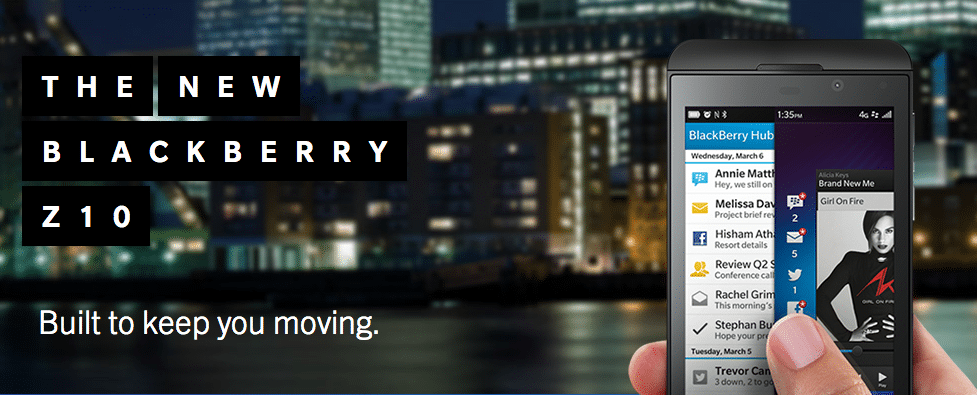Skift Take
BB's only hope going forward is the huge community of business users and travelers, those who still work in the corporateland, increasingly collaborate through remote work, but would still like consumer-driven features.
Whether or not BlackBerry is going to make it in the long run, the software the company unveiled today is extremely impressive, especially if you’re a business user. It’s clear that BlackBerry (the company formerly known as Research in Motion) is doubling down on its core audience in rich countries: enterprise customers in law, finance, insurance, and government.
The BlackBerry 10 operating system has a handful of core features that are highly evolved, business-centric re-conceptions of features that barely exist in iOS (the operating system for iPhones) and Android. Watching them in action, it seems credible that the company is delivering on its goal to make phones into little computers rather than simply “mobile devices.”
BlackBerry’s global announcement of its new phones is available to stream on the web, but the company’s own short video demonstrations of the phones’ most interesting features are far more informative, so I’ve rounded them up below.
BlackBerry Messenger: video chat with screen– and document-sharing
BlackBerry’s Messenger feature has long been a favorite of customers in the developing world, where free and unlimited messaging was unavailable until cheap Android handsets came along. The new BlackBerry Messenger incorporates a video chat feature that resembles Apple’s FaceTime.
Most interesting, however, is that BBM now allows for screen-sharing. This is the sort of feature that is essential to remote teleconferencing but is rarely seen outside desktop computers. In addition, third-party apps like DocsToGo allow document sharing without ever leaving a video chat session.
Blackberry Balance: commingling personal and work content
Users who don’t want to carry separate work and personal phones—and companies who want to further blur the line between work and home life—will appreciate that Blackberry 10 phones have two separate modes: work and personal. Intriguingly, while the phone keeps work and personal data entirely separate, both can be viewed at the same time. If a user leaves a firm, the company can wipe just the work data on her device. That may be a selling point to corporate IT departments.
Blackberry Flow: fast application switching and one-handed operation
Here’s how you conduct business meetings with one hand tied behind your back—literally, if you wish.
Throughout today’s presentation, BlackBerry CEO Thorsten Heins emphasized that BlackBerry 10 allows people to accomplish tasks in different apps without ever having to return to the phone’s home screen. This behavior is reminiscent of the interface that is supposed to be such a powerful differentiator for the new, China-centric mobile OS Jolla, and if it works, for many people it will be a significant upgrade over the painfully slow application switching that happens in the iPhone.
Application management: Now companies can create their own app stores, available only to their employees.
Enterprise customers who want tight control over the apps on their employees’ phones, for example in finance and government, can determine which apps are allowed to be downloaded to their Blackberry 10 phones. They can also create custom app stores in which they try more subtle means to encourage adoption, such as company-wide app suggestions.
App partners: Yes, Blackberry 10 can do Facebook and Skype
Blackberry 10 launches with 70,000 apps, less than a tenth the number of apps on Apple and Google’s mobile app stores. But what matters to most users is: Are they the apps I want to use? Those who are devoted to more obscure apps on their existing smartphones are going to be disappointed for the moment. But in terms of basic functionality—productivity, connectivity, social networking—BlackBerry has done an admirable job of making sure that the biggest developers have created versions of their apps for BlackBerry 10. That includes Facebook, Twitter, and Skype.
But will BlackBerry still be around at the end of your three-year contract?
BlackBerry’s new phones are high-end devices, which means that, unlocked, they cost as much as a new iPhone or top of the line Android phone: $600. Most customers will probably want to buy them subsidized, on a mobile plan, and for them, the news is mixed. The phones will be available by February in most markets for around $150, but the catch is that this price requires committing to a three-year plan as opposed to the typical two years.
This raises two questions: The first is, given the rate at which mobile technology evolves, will people really want to be using the same BlackBerry phone three years from now, by which point it will look positively sad compared to newer iPhone and Android models? And, more to the point, will BlackBerry still be around to support its phones and app ecosystem? Even if BlackBerry 10 is a hit, the company is still likely to be in for major losses over the next two years.
![]() This story originally appeared on Quartz, a Skift content partner.
This story originally appeared on Quartz, a Skift content partner.
Additional links from Quartz:
The Daily Newsletter
Our daily coverage of the global travel industry. Written by editors and analysts from across Skift’s brands.
Have a confidential tip for Skift? Get in touch
Tags: blackberry, gadget
